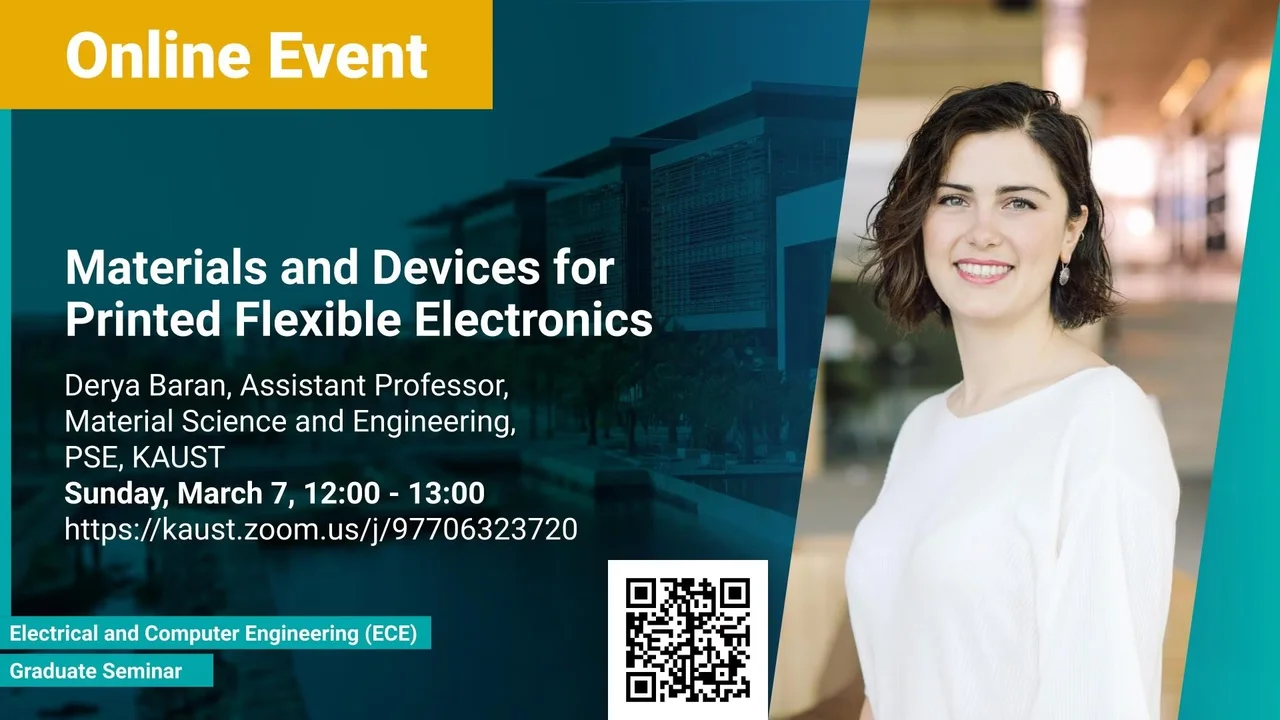
Materials and Devices for Printed Flexible Electronics
- Derya Baran, Assistant Professor, Material Science and Engineering, PSE, KAUST
KAUST
The need for big data that the internet of things (IoT) has created in recent years has turned the focus on integrating the human body in the quest to understand it better, and in turn use such information for detection and prevention of harmful conditions. Applications in which continuous and uninterrupted operation is required, or where the use of external power sources may be challenging demands the use of self-powered autonomous systems. Organic photovoltaic devices are flexible, lightweight, and soft, capable of interacting with the human body and its mechanical demands. Their processability from solutions permits their adaptation to versatile fabrication techniques such as spin coating, roll-to-roll coating and inkjet printing, with benefits including low material usage and freedom of design. In this talk, I will present how organic photovoltaics can be utilized in printed electronics as energy harvesting devices and go through the historical progress of organic/hybrid photovoltaics as well as the main activities that are ongoing in my research lab ‘Omegalab’.
Overview
Abstract
The need for big data that the internet of things (IoT) has created in recent years has turned the focus on integrating the human body in the quest to understand it better, and in turn, use such information for detection and prevention of harmful conditions. Applications in which continuous and uninterrupted operation is required, or where the use of external power sources may be challenging demands the use of self-powered autonomous systems. Organic photovoltaic devices are flexible, lightweight, and soft, capable of interacting with the human body and its mechanical demands. Their processability from solutions permits their adaptation to versatile fabrication techniques such as spin coating, roll-to-roll coating and inkjet printing, with benefits including low material usage and freedom of design. In this talk, I will present how organic photovoltaics can be utilized in printed electronics as energy harvesting devices and go through the historical progress of organic/hybrid photovoltaics as well as the main activities that are ongoing in my research lab ‘Omegalab’.
Brief Biography
Derya, originally from Turkey, is a passionate scientist who received her doctorate degree from Friedrich-Alexander Erlangen-Nürnberg University in Materials Science and Engineering in 2014. Since 2017, she is an assistant professor at King Abdullah University of Science and Technology (KAUST), Saudi Arabia. Her research group (OMEGALAB) focus on engineering organic and hybrid materials for energy harvesting devices. Derya co-authored more than 100 publications including Nature Materials, Nature Materials Reviews, Science etc. and is a recipient of Helmholtz Association postdoc grant in 2015 (joint with Imperial College London). She was selected for MIT Technology Review’s 2018 list of ‘35 Innovators under 35’ for her development of transparent power glass that can generate electricity and block the heat for greenhouses and future buildings. She is co-founder of two start-ups. As a scientist and entrepreneur, she strives to be a role model to younger generations.